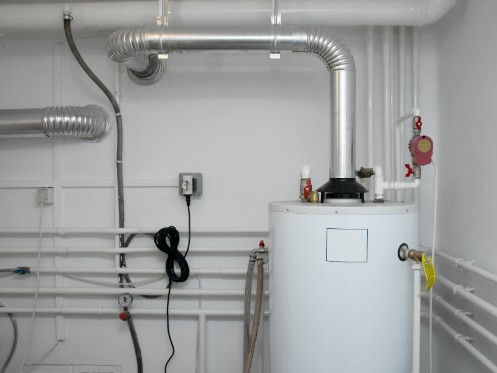Water heaters are designed to last for at least 10-20 years before needing to be replaced. However, improvements to efficiency are being made regularly. When a water heater is more efficient, it uses less energy to create heat. By using less energy, your monthly energy bills shouldn’t be as high. More efficient units also tend to last longer.
While you can wait until your water heater needs to be replaced, upgrading to a more efficient one helps you save money in the long run. If you’re currently searching for a new unit, you may be wondering how efficient your water heater should be. The answer depends on several factors, which include the size of your home and how much you’re willing to spend.
Measuring Water Heater Efficiency
The energy efficiency of a hot water heater is determined by a uniform energy factor (UEF) rating. This rating is based on the amount of energy that the water heater needs to use to power the unit and heat the water. Higher UEF ratings indicate that the system is more efficient.
A water heater’s energy efficiency rating is displayed alongside the annual operating costs on the Energy Guide label. You’re able to compare the operating costs with the efficiency to identify which system is right for you. While more efficient systems often have a higher upfront price, they provide ample savings because of the decrease in your monthly energy bills.
UEF ratings are mainly determined by placing water heaters into four separate categories before assessing their performance based on the amount of hot water they use. While higher UEF ratings result in more efficient systems, your annual operating costs won’t automatically be lower with a high rating. The fuel source you use can also dictate what the costs are. Along with the water heater’s energy factor, you should also take the unit size, overall cost, and fuel type into account.
Old vs. New Water Heaters
Tankless water heaters are meant to last for at least 20 years before you need to replace them. In comparison, traditional water heaters that are outfitted with standard water tanks can last for upwards of 10-15 years before you notice signs that their efficiency is decreasing. As the efficiency of a unit declines, you will spend more on energy to heat up water in your home. At this stage, replacing it may be a better choice.
One factor that results in a traditional water heater losing efficiency is sediment buildup. When a water heater is continuously subjected to hard water, sediments, such as sand, iron, grit, calcium carbonate, and magnesium, will accumulate. Unless the unit is maintained and cleaned, the sediment will drop to the lowermost portion of the tank, which makes the unit less efficient. Obtaining a new water heater mitigates these issues entirely.
Gas or Electric Water Heater for Efficiency
The main consideration for you to keep in mind when replacing a water heater is what type of fuel source you’ll use. The fuel source has an impact on what the efficiency rating of the unit will be. Keep in mind that gas water heaters usually aren’t as efficient as electric ones. However, gas is more affordable.
Efficient Gas Water Heater Considerations
There are three types of gas water heaters you can obtain, and these include a standard unit, an Energy Star unit, and a tankless unit. Standard gas tanks come with UEF ratings of around 0.60, which means that upwards of 60% of the energy that’s used to heat the water is being converted into heat. This is the baseline efficiency rating for modern gas water heaters.
Energy Star gas tanks have an efficiency rating of at least 0.65. These units come with more insulation and are equipped with an electrical igniter that serves as the pilot light. All the extra features implemented in an Energy Star unit are designed to reduce gas costs. Keep in mind that buying an Energy Star unit may allow you to qualify for a rebate depending on where you live and the type of system you purchase.
Tankless gas water heaters are highly advanced units that are smaller than their conventional counterparts. These systems are known for their energy efficiency and space savings. The types of tankless water heaters available include non-condensing tankless, condensing tankless, and condensing hybrid tankless, the latter of which is the most efficient type around.
Efficient Electric Water Heater Considerations
Heating water with electricity invariably costs more than heating it with gas. However, there are numerous efficiency benefits that you’ll gain in other areas. Electrical units tend to come with higher efficiency ratings, which means that you’ll save more money every year. The different types of electric water heaters that you can select from include standard electric tanks, high-efficiency electric tanks, and hybrid heat pump units.
Standard electric tanks usually come with a minimum UEF rating of 0.90, which is similar to the rating of a tankless gas unit. As for high-efficiency electric tanks, they have more insulation and come with UEF ratings that can reach as high as 0.95.
If efficiency is your main concern when buying a water heater, you may want to consider a hybrid heat pump water heater. These units come with efficiency ratings of more than 2.0, which means that your energy savings can be much higher than they would be with other unit types. Hybrid heat pump units are designed to use ambient air temperature in the home to aid in the heating process, which means that the unit doesn’t need to use as much electricity during this process.
What Efficiency Rating Is Recommended?
The type of water heater you purchase determines what the efficiency rating can be. If you select a conventional electric or gas water heater, UEF ratings must be between 0.65-0.95 for the unit to receive an Energy Star label. If your system is in the uppermost portion of this range, you’ll benefit from energy savings.
If you select a heat pump water heater, their UEF ratings can range from 2.75-3.5. Your water heater doesn’t need to be the most efficient one on the market. If you select a conventional gas unit with an efficiency rating of 0.65, the unit will still be relatively efficient. However, a more efficient unit will help you save a considerable sum of money.
If you’re interested in upgrading your existing water heater, leave it to the professionals. Here at Express Plumbing Heating & Air, our team has many years of experience in providing Boise, ID residents with water heater installation and replacement services. This experience allows us to install new water heaters in a timely manner. We also provide water heater and maintenance services to ensure your current unit is running well and properly heating the water in your home. At Express Plumbing Heating & Air, we offer a range of additional services, which include drain cleaning, sewer repair, and HVAC installation. Call Express Plumbing Heating & Air today to learn about our financing options or schedule a water heater install.




